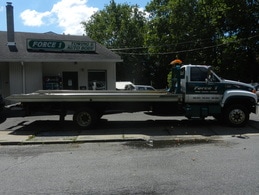Ready for reliable and friendly service in a towing company? Combined with competitive rates? Call Force 1 Towing and Auto Body in Catasauqua at 610-266-6721
Governor Ivey Awards $82.45 Million for Improved Access to Broadband through Alabama Middle-Mile Network
MONTGOMERY – Governor Kay Ivey on Tuesday awarded an $82.45 million grant to help make statewide broadband service availability a more attainable goal throughout Alabama.
Announcing the grant today at the Central Alabama Electric Cooperative near Prattville, Governor Ivey said it will be used by Fiber Utility Network, a corporation formed by eight rural electric cooperatives to fund a “middle-mile” broadband network that will have a statewide impact.
The eight co-ops include: Central Alabama, Coosa Valley, Covington, Cullman, Joe Wheeler, North Alabama, PowerSouth and Tombigbee.
The Alabama Middle-Mile Network project involves filling in gaps in broadband expansion and results in more cost-effective and feasible ways to provide broadband service availability to residents in rural areas.
“Achieving full broadband coverage is a journey, not a short trip, and today is an important step toward completing that journey. The Alabama Middle-Mile project – the infrastructure setting part of this journey – is going to lead our state to be the model for the nation when it comes to providing broadband capabilities,” said Governor Ivey. “In 2022, being able to be connected at home, work or on the on go is absolutely necessary, and this is certainly key to making that a reality.”
The Fiber Utility Network will create a middle-mile network that will connect almost 3,000 miles of existing and new fiber infrastructure within a three-year period. When complete, the network will provide improved access to unserved areas for the last-mile projects that provide actual broadband availability to homes, businesses and schools. Once connected, residents will have the ability to become a customer of the last-mile broadband providers.
Funds for the project are being provided through the American Rescue Plan Act. The use of those funds was approved earlier this year by the Alabama Legislature.
The Alabama Department of Economic and Community Affairs is administering the award through its Alabama Digital Expansion Division. The division was created by the Legislature and Governor Ivey to specifically target methods and means to supply broadband services to unserved and underserved areas of Alabama.
“The project is the springboard to supplying broadband services for rural residents, businesses, educational facilities and other community anchors,” said ADECA Director Kenneth Boswell. “I commend the Fiber Utility Network for their willingness to undertake this necessary step to ensure more Alabamians have access to these services.”
“The eight electric cooperatives that make up the Fiber Utility Network are honored to be a part of building a middle mile network to bring internet service closer to those Alabamians,” said Tom Stackhouse, president of the Fiber Utility Network. “We want to thank Governor Ivey and the staff at ADECA for the vision, leadership and assistance to make this a reality.”
Three legislators who have played a role in broadband expansion also participated in today’s announcement.
“In terms of broadband, this is a great leap forward,” said state Sen. Clay Scofield. “This will really put us at the forefront of broadband in Alabama, and it will help us expand much quicker and at a more economical cost.” Scofield serves as the chairman of the Alabama Digital Expansion Authority board.
“This is a tremendous step in the right direction to digitally connect all of Alabama, especially the Black Belt,” said state Sen. Bobby Singleton, who is a member of the Alabama Digital Expansion Authority board. “I am proud to stand with Governor Ivey to award these needed funds to elevate these communities and provide a service that will have an impact on the entire state.”
“This project is probably the most significant step we’ve taken to get high-speed internet access to everyone in Alabama,” said state Rep. Randall Shedd, who serves as co-chairman of the Alabama Digital Expansion Authority board.
ADECA administers a wide range of programs that support law enforcement, victim programs, economic development, water resource management, energy conservation and recreation.
Announcing the grant today at the Central Alabama Electric Cooperative near Prattville, Governor Ivey said it will be used by Fiber Utility Network, a corporation formed by eight rural electric cooperatives to fund a “middle-mile” broadband network that will have a statewide impact.
The eight co-ops include: Central Alabama, Coosa Valley, Covington, Cullman, Joe Wheeler, North Alabama, PowerSouth and Tombigbee.
The Alabama Middle-Mile Network project involves filling in gaps in broadband expansion and results in more cost-effective and feasible ways to provide broadband service availability to residents in rural areas.
“Achieving full broadband coverage is a journey, not a short trip, and today is an important step toward completing that journey. The Alabama Middle-Mile project – the infrastructure setting part of this journey – is going to lead our state to be the model for the nation when it comes to providing broadband capabilities,” said Governor Ivey. “In 2022, being able to be connected at home, work or on the on go is absolutely necessary, and this is certainly key to making that a reality.”
The Fiber Utility Network will create a middle-mile network that will connect almost 3,000 miles of existing and new fiber infrastructure within a three-year period. When complete, the network will provide improved access to unserved areas for the last-mile projects that provide actual broadband availability to homes, businesses and schools. Once connected, residents will have the ability to become a customer of the last-mile broadband providers.
Funds for the project are being provided through the American Rescue Plan Act. The use of those funds was approved earlier this year by the Alabama Legislature.
The Alabama Department of Economic and Community Affairs is administering the award through its Alabama Digital Expansion Division. The division was created by the Legislature and Governor Ivey to specifically target methods and means to supply broadband services to unserved and underserved areas of Alabama.
“The project is the springboard to supplying broadband services for rural residents, businesses, educational facilities and other community anchors,” said ADECA Director Kenneth Boswell. “I commend the Fiber Utility Network for their willingness to undertake this necessary step to ensure more Alabamians have access to these services.”
“The eight electric cooperatives that make up the Fiber Utility Network are honored to be a part of building a middle mile network to bring internet service closer to those Alabamians,” said Tom Stackhouse, president of the Fiber Utility Network. “We want to thank Governor Ivey and the staff at ADECA for the vision, leadership and assistance to make this a reality.”
Three legislators who have played a role in broadband expansion also participated in today’s announcement.
“In terms of broadband, this is a great leap forward,” said state Sen. Clay Scofield. “This will really put us at the forefront of broadband in Alabama, and it will help us expand much quicker and at a more economical cost.” Scofield serves as the chairman of the Alabama Digital Expansion Authority board.
“This is a tremendous step in the right direction to digitally connect all of Alabama, especially the Black Belt,” said state Sen. Bobby Singleton, who is a member of the Alabama Digital Expansion Authority board. “I am proud to stand with Governor Ivey to award these needed funds to elevate these communities and provide a service that will have an impact on the entire state.”
“This project is probably the most significant step we’ve taken to get high-speed internet access to everyone in Alabama,” said state Rep. Randall Shedd, who serves as co-chairman of the Alabama Digital Expansion Authority board.
ADECA administers a wide range of programs that support law enforcement, victim programs, economic development, water resource management, energy conservation and recreation.



